 By Ray Rivers By Ray Rivers
April 25, 2015
BURLINGTON, ON
Last week Canada’s premiers met to brag about each other’s achievements in reducing greenhouse gas emissions. Alberta, whose increases negated everyone else’s reductions, was absent, presumably busy with a provincial election. Saskatchewan’s Brad Wall argued for business as usual, since our greenhouse gas contributions amount to a small fraction of the global total, thereby challenging Ontario’s Premier Wynne on her government’s successes.
 Climate change is real – except to those who wrote the last federal budget document. And Mr. Harper’s government with an historic legacy of denying climate change and otherwise doing squat, blamed the provinces for Canada’s crappy performance. With that outburst from the federal environment minister, and given an impending federal budget, even a pessimist might have expected something, even anything, about climate change action in the budget. Sorry pessimists!
When international oil prices tumbled, along with federal income projections, finance minister Joe Oliver panicked, delayed the budget and dumped Canada’s GM shares (bought to save GM in 2008) for a whacking loss of over $3 billion. Next, he robbed the government’s piggy bank, its fiscal reserve for as much as $2 billion, and then pulled some sleight-of-hand around future employee contract negotiations to manufacture a small surplus.
Canada’s economy is heading into recession, led by the faltering Alberta economy. So one would have expected some new measures to stimulate the economy. But there is scant discussion of economic drivers in Joe Oliver’s master plan, unless one considers new corporate tax cuts, or re-announcing the tired old federal training, innovation and infrastructure initiatives.
This budget is arguably the most ideological document to come out of Mr. Harper’s decade of governance, notably excepting Bill C-38, also called the environmental destruction act. It is a common belief among the extreme right-wing that government, itself, is the problem and smaller government is always better government. One wonders why people who believe that government is so insignificant try so hard to get elected into office.
 Harper needs the votes of the greatest democrats in the nation – the people who always turn out on voting day – the seniors. This federal budget is about buying votes in the upcoming election. Mr. Harper’s promised tax break for the highest income Canadian families through income sharing is now formalized. But to win his next election, Harper needs the votes of the greatest democrats in the nation – the people who always turn out on voting day – the seniors.
It was only a couple of years ago that Mr. Harper denied seniors their Old Age Security by raising the retirement age to 67. And by blocking provincial demands to upgrade the Canada Pension Plan he angered seniors groups. So, to make amends, he is upping the contribution limit for TFSAs (interest tax-free savings accounts) to a whopping $10,000. And the well-heeled will no doubt be appreciative.
There was another budget announced this week. Though unlike the feds, Ontario hasn’t yet balanced its budget. Ontario’s finance minister, Charles Sousa, is privatizing electricity generation, going back to the future and completing the job even Mike Harris and Ernie Eves couldn’t get done. The money from this dis-investment will be allocated to infrastructure and building transit and roads for the GTA, in particular.
The Province is finally allowing beer to be sold in supermarkets, albeit with some antediluvian rules to discourage customers. And there is good reason for that since expanded provincial beer consumption might, inadvertently, put a dent in Premier Wynne’s climate change initiatives.
 Will Burlington’s Beer Fest benefit from the change in beer selling policy the provincial government put forward? Apparently global beer consumption in 2004 was 150.392 billion litres, resulting in a significant 9,354,382 metric tonnes of CO2 emissions. Save the planet, drink whiskey.
These are two completely different budgets from two very different governments. Yet, Ontario could get to balance if they only increased progressive income taxes. Instead, the only provincial tax hike is a recessionary ‘buck-a-box’ for beer – likely a concession to the trans-national oligopolies controlling our Beer Stores. The benefits of the planned investments in infrastructure will be almost immediate and broadly felt. And, eventually the rest of the public will appreciate the economic benefits from faster commute times.
Joe Oliver’s budget, on the other hand, has done little but widen the spread between the haves and have-nots. It is understood that the vast majority of benefits from the family income-splitting scheme will go to the wealthiest families. And this interest tax-free account makes no economic sense. Since the average deposit into Tax Free Savings Accounts (TFSA) was about $3000 when the limit had been $5500, who do we think will benefit when the limit goes to $10,000?
 Rivers suggests our economy is heading for a recession. Savings are essential in order to fund new investment. But without consumption there is no demand for investment. All of our income is either spent on consumption or saved. So were that new limit on TFSA’s to be actualized, there could be at least $4500 less consumption per saver per year – which is highly recessionary. And the last thing this faltering Canadian economy needs is to be pushed faster and further towards recession.
I have heard some call this federal budget a blow to generational equity – primarily by young people. Perhaps it is, but at a minimum it is a clear case of ideology trumping sound economics. I always believed the time to reward yourself (with tax breaks) is when the economy is booming – not when you are likely heading into a recession.
 Ray Rivers writes weekly on both federal and provincial politics, applying his more than 25 years as a federal bureaucrat to his thinking. Rivers was a candidate for provincial office in Burlington where he ran as a Liberal against Cam Jackson in 1995, the year Mike Harris and the Common Sense Revolution swept the province. Ray Rivers writes weekly on both federal and provincial politics, applying his more than 25 years as a federal bureaucrat to his thinking. Rivers was a candidate for provincial office in Burlington where he ran as a Liberal against Cam Jackson in 1995, the year Mike Harris and the Common Sense Revolution swept the province.
Background links:
Provincial Climate Change Federal Budget TFSA Changes Contingency Fund
A Tax on Future Generations Retirement Savings Tax Breaks GM Shares Bill C-38
Provincial Budget Provincial Budget Priorities Beer in Stores Beer and Climate Change

 By Staff By Staff
April 24, 2015
BURLINGTON, ON
Burlington MP Mike Wallace spoke yesterday in the House of Commons and said:
 Burlington MP Mike Wallace at a Conservative Caucus meeting in Ottawa Mr. Speaker, I really appreciate the member’s honesty. He was clear in his speech that his party is in favour of increased taxes to pay for a number of the programs the New Democrats have indicated they are interested in. I am actually looking forward to debating those issues at election time also.
However, I am a little confused. On one hand, in his speech he talked about corporations needing to pay their own way, and then the previous speaker from his party was taking credit for the small business tax rate going from 11% to 9%. Ninety per cent of the businesses in the country are small businesses.
Are the New Democrats for increasing taxes on business, or are they against taxes going up for business? It is a very confusing message. I do not think they know what they actually stand for. I would be interested to hear what he has to say about that.
Wallace was responding to remarks made by Jack Harris, the NDP Member for St. Johns East in Newfoundland who had said previously:
Mr. Speaker, it is a pleasure to have an opportunity to speak to the Conservative budget. The budget is no pleasure, but to have a chance to talk about what is wrong with it, where it is lacking, the negative direction it is taking the country and some of the things that my party, the NDP, would do instead is something I cherish.
The Conservative budget would spend billions in handouts to the wealthiest at a time when the government should be investing in accessible child care, affordable housing and supporting seniors who are struggling to get by. Places like Newfoundland and Labrador and the people there and the Atlantic who have critical issues that need to be addressed, like regional economic development and supporting communities, issues such as the constitutional obligation of the government to support Marine Atlantic, are absent from this budget.
Absent as well are the $280 million that the government promised the government of Newfoundland and Labrador in a fishing industry development fund in response to the consequences of CETA and the request to remove its powers to expect local processing in fisheries. Where is that? All of these are absent.
Things get a little testy at time in the House of Commons. When Wallace was finished speak Harris stood again and responded with
Mr. Speaker, we have noticed over here that the hon. member is confused on many occasions. He did not actually need to tell us that.
If he had been listening, he would have known that the leader of the NDP gave a major speech several months ago in which he called for a decrease in small business tax rates down to 9%. That was very clear. He also called for an increase in the capital cost allowance for manufacturers. This is desperately needed in the member’s neck of the woods, in Ontario, because of the hollowing out of manufacturing that has happened during the government’s administration. We are trying to fix that.
We do understand what needs to be done, but we do not support the notion that major corporations, highly profitable corporations, can have tax cuts and sit on that cash for years and years and not use it to create jobs.
Both New Democrat Harris from Newfoundland and Conservative Wallace from Burlington were commenting on the federal budget that was handed down the day before. Fine men representing their constituents.

 By Pepper Parr By Pepper Parr
April 22, 2015
BURLINGTON, ON
Later this month we will see, for the first time, a policy initiative that the Mayor has put his mark on.
During Rick Golding’s first term, much of the thinking was done during his election campaign. He produced a number of excellent position papers that we will review once we hear what the Mayor has to say on intensification.
Mayor Goldring has realized that his constituents, to a significant degree, do not fully understand what is meant by intensification and how Burlington is going to face that challenge – and for Burlington this is a challenge.
 There are parts of the city where any form of intensification is not going to get past the first sentence. The backlash in some communities will be so strong that the Mayor, and every member of this Council, will quickly move on to a subject that leaves smiles on the faces of the voters. There are parts of the city where any form of intensification is not going to get past the first sentence. The backlash in some communities will be so strong that the Mayor, and every member of this Council, will quickly move on to a subject that leaves smiles on the faces of the voters.
Ontario is changing and Burlington is going to have to change with it – it will not be an easy transition and the Mayor has decided this is a subject he can show some leadership.
During his first term of office Mayor Goldring sponsored a series of talks on subjects that he felt were important to the city. He brought in some excellent speakers, including Andre Picard one of the foremost thinkers in the country on health related policies. Goldring brought in Ken Greenberg, a noted planner who works out of Toronto for the most part and has been instrumental in changing some of the thinking on how municipalities relate to developers and how the two can work together.
This time the Mayor is going to make the presentation – it will be his show. He will pull together the content and decide how he wants to present the data he will have collected.
He will, we assume, explain the policy guidelines within which the city has to work and what he feels are some of the directions the city can take as it works to meet the population increases the province has imposed on the city.
“Intensification is an issue that has captured the interest of many Burlington residents” said the Mayor on his web site. “People want to know why our community is seeing more buildings, particularly in the form of mid-rise and high-rise structures. Hear about the federal and provincial policies that are driving intensification and how Halton and Burlington are managing these pressures. Learn where we are growing, as well as innovative ideas we are investigating.”
The event is titled: Building Burlington: Where to build in a city that is built out. Problem with the title is that the city is not built out. There are hundreds of acres of land left for residential properties and more than we need in the way of employment lands.
The free event is “sold out” ; with the room full the Mayor will be speaking to an audience that wants to hear what he has to say. One hopes there will be vigorous debate and a fulsome exchange of views – both are needed.

 By Greg Woodruff By Greg Woodruff
April 21, 2015
BURLINGTON, ON
On March 24th city staff held a meeting to discuss possible zoning changes to a large section of Plains Road. The area discussed was on the South side of Plains Road positioned East of Waterdown Road. Later residents discovered a developer is already advertising to sell 75 condo units at 40-58 Plains Road East in violation of current zoning character provisions.
Though it was casually mentioned the city had been “approached” by a developer; no indication was given that a specific plan was in motion.
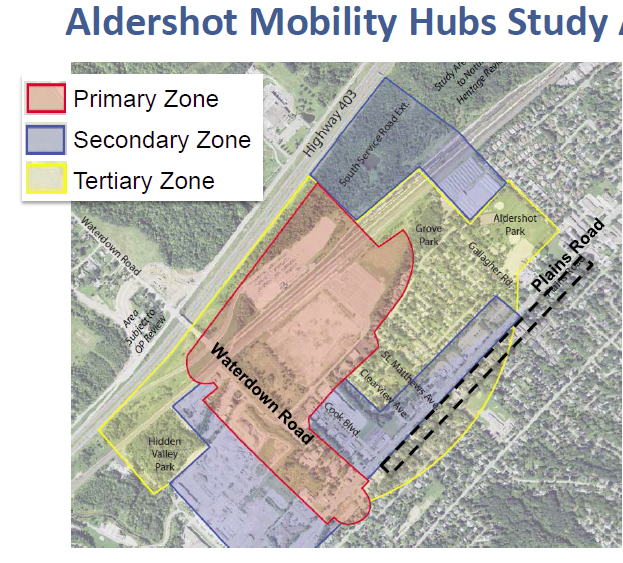 The public meeting was an information gathering occasion for the city planner who said he was there to listen to the community and what they wanted. He did make mention of an project that was not formal yet – the residents think the project is well along the development path. The graphic above shows the portion of Plains Rod that was under review and its proximity to the Aldershot GO station and the suggestion that the pink area could be developed as a “mobility hub” This leaves the distinct impression that this meeting was in bad faith. It seems like the purpose of the meeting was only to say the public was “consulted” on an issue staff already had a plan to change. I realize that staff may not have been in a position to mention this specific development. At minimum the staff could have indicated that if the zoning was changed they would expect to see condo buildings in the “range of 70 plus units”. Why they did not could be anything from simple lack of communication to an outright attempt to misslead the public.
I think traditionally the public has considered staff as neutral parties implementing zoning regulations and changes in a balanced way. To some it seems like staff have now been co-opted into provincial employees with “intensification” as the decisive factor in decision making. If staff failed to mention this development or the like because someone judged that residents would have a negative reaction; then they are no longer operating in a neutral way. This is unfair not only to residents and developers, but also to the staff themselves.
Some basic questions now need answering:
1) What exactly is the current function and purpose of staff in regard to planning and development?
2) Was the city made aware of this 75 unit proposal from the developer?
3) Was there any conversation among or direction to staff about hiding the nature of probable developments if the zoning was changed?
4) Did any staff indicate that they would work for the developer to get the zoning changed?
Recommendations:
1) All communication between staff and this developer on this matter needs to be made public.
2) Staff are “trading” zoning violations for attributes to buildings. “Horse trading” zoning violations needs to be made into a transparent public process.
In this area we have less trees, less businesses and more congestion.
I reject outright the suggestion that the liveability of our community needs to be sacrificed for the provincial “intensification” mandate. Intensification is designed to spur positive changes in our community; not serve as a rationalization for negative ones.
Greg Woodruff runs the Citizens for Responsible Development. He was a candidate for the office of Chair of the Region of Halton. There is more about that organization here.
The Gazette reported on that March meeting.

 By Ray Rivers By Ray Rivers
April 16, 2015
BURLINGTON, ON
“A politician that has been caught mishandling public funds and who then engages in political subterfuge in an attempt to cover up the error is doing a Duffster Dive”.
It is possible that the suspended senator, Mike Duffy, will avoid going to jail on any of the 31 charges against him. But, at least in the court of public opinion, he is guilty for his ambition, arrogance, avarice – and his duffster diving.
 All on the public dime? Does it really matter that Mr. Duffy, having been appointed to represent PEI, actually parks his duff in Ontario. It is not like he was elected by real PEI residents so he is accountable to no one, except possibly the PM who appointed him. But that quaint historical rule about residency allowed him to claim expenses he shouldn’t have, since Ottawa was his home, not a temporary residence. Don’t we all wish for a job with a fat salary as well as money for the groceries?
The Senate, itself, is an historical mistake – a solution searching for a problem, and in due course becoming the problem itself. And so this trial will be as much about the Senate as it is about Duffy getting a free ride at the public trough. How can there be clear rules about what one does or doesn’t legitimately do in the absence of a clear understanding of the role and purpose of that organization?
Though he has not been called to attend yet, this trial is also very much about Stephen Harper, his judgement and his back room boys. After all, the PM appointed Duffy to the Senate, when even Duffy now must doubt the legitimacy of his appointment. And a chunk of the questionable expenses were rung-up attending those Tory events, in which Duffy had proven himself to be a heavy-weight, when it came to fundraising for the PM’s party.
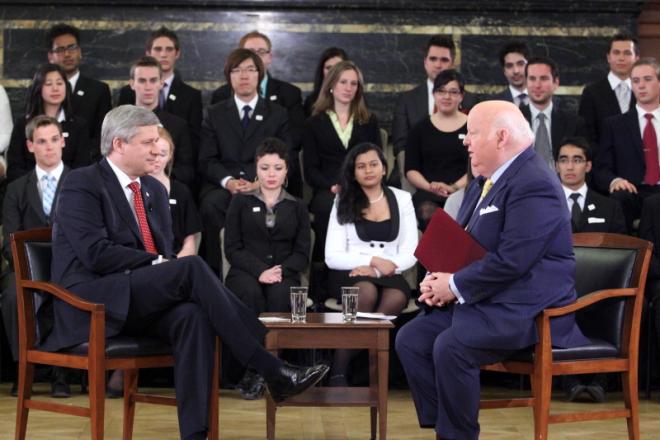 Stephen Harper and Mike Duffy – pals forever? On one hand it is hard not to feel a little sorry for Duffy. He was, presumably, only doing what he thought he could get away with. A jovial fellow who now appears to understand the error of his ways and who was happy to pay back what he’d wrongly accepted, with somebody else’s money. And he must be suffering emotionally, since those whose favour he sought so badly to obtain have now turned their backs and shun him.
On the other hand Mike Duffy isn’t a decent fellow who deserves our pity. This was apparent to anyone who witnessed the fiasco which occurred on Duffy’s political broadcast during the 2008 election. Then Liberal leader Stéphane Dion, whose first language is French, was asked an illogical, possibly trick or set-up question – “If you were prime minister now, what would you have done about the economy and this crisis that Mr. Harper has not done?”
Nobody could answer that question, though Dion tried and stumbled, asking repeatedly, for the question and the interview to be restarted. Duffy aired the entire interview, including all of the false starts, and then later editorialized his view that Dion had just demonstrated his incompetence.
Duffy was playing partisan politics. The Canadian Broadcast Standards Council ruled that Duffy had violated broadcasting codes and ethics and that the interview was not fair, balanced or even-handed and, in fact, had significantly misrepresented the interview and its participant.
Though Mike Duffy had won several awards over his lifetime in broadcasting, this sad episode was unprofessional. Worse than unprofessional, it was mean and brutally unfair to Mr. Dion, sealing his fate in the 2008 election and beyond.
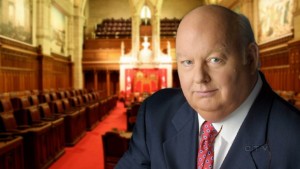 Senator Mike Duffy – currently under suspension. And, of course, the destruction of Mr. Dion as a contender helped enable Mr. Harper to win the election. Duffy, if he didn’t already have the affection of the Tory leader, sure did after this little trick. And it was shortly after the 2008 election that Mr. Harper appointed Duffy to the Senate.
Background links:
Duffy Diaries Duffy and Harper Duffy Biog Duffy Realizes His Error
Senate Oversight Crown VS Harper Broadcasting Standards Rebuke
 Ray Rivers writes weekly on both federal and provincial politics, applying his more than 25 years as a federal bureaucrat to his thinking. Rivers was a candidate for provincial office in Burlington where he ran as a Liberal against Cam Jackson in 1995, the year Mike Harris and the Common Sense Revolution swept the province. Ray Rivers writes weekly on both federal and provincial politics, applying his more than 25 years as a federal bureaucrat to his thinking. Rivers was a candidate for provincial office in Burlington where he ran as a Liberal against Cam Jackson in 1995, the year Mike Harris and the Common Sense Revolution swept the province.

 By Ray Rivers By Ray Rivers
April 9, 2015
BURLINGTON, ON
Ontario’s finance minister, Charles Sousa, boasted that the government had beaten down its projected 2014 deficit target by $1.6 billion, and was on track to eliminate the deficit by 2018.
He was speaking at a Greater Toronto Board of Trade meeting last week, when he announced this good piece of news. And another bit of good news is that a carbon tax doesn’t appear to be in the works.
And why would it be? The McGuinty/Wynne governments already have an outstanding record in fighting climate change. While Canada’s greenhouse gas (GHG) emissions sky-rocketed from 1990 levels, (18% increase to 2012), Ontario’s emissions plummeted by an impressive 6%.
And besides, Ontario electricity customers are already paying a ‘de-facto’ carbon tax through our utility bills, which have increased over the years, in part to pay for the conversion of Ontario’s dated and dirty coal plants to cleaner energy.
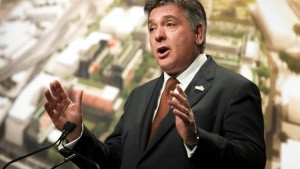 Ontario’s Minister of Finance Charles Sousa – watch the hands, they are quicker than the eye. So rather than hit consumers with another carbon tax, Ontario’s Premier Wynne has decided to join Quebec and California in a continent-wide carbon trading system. Also called cap-and-trade, emissions trading is actually an Ontario-born solution to pollution. A University of Toronto economics professor, Robert Dales, back in the sixties was credited with defining the concept. Ontario’s formal entry into this continental cap-and-trade block will create a market of over 60 million people encompassing almost two thirds of Canadians.
The finance minister noted in his remarks that an additional half-million new jobs have been created since the 2008 recession, and that Ontario has become the top destination for foreign direct investment among jurisdictions in Canada and the U.S.A. Lower oil prices and a falling Canadian dollar are like gifts from heaven for our manufacturers. And with two thirds of our students exercising post-secondary options, the province is leading the country in skilled labour.
So why do we still have this deficit? Ontario already has the lowest per capita spending of any jurisdiction in Canada and, with a predicted growth rate of only 0.8% per annum, it is likely to stay that way. So perhaps the government needs to be looking somewhere else for a solution to its financial predicament. Premier Wynne is apparently exploring the sale of some crown assets, such as Hydro One, which might be in the public interest to divest, and provide some much needed cash to boot.
 You see them on the streets of New York – with three walnut shells on a make shift table and asking you to bet on which one the pea is under – it’s a game of the hand being quicker than they eye – the politicians do it all the time – with your money. But sustainable financing requires more than a fire-sale of crown assets. That would involve re-engineering of the income side of the balance sheet. Alberta, has finally abandoned its ideologically driven flat-tax experiment, conceding that progressive income taxes are essential just to keep its deficit down to $5 billion dollars – a deficit greater than Ontario’s on a per capita basis. Alberta’s premier, Jim Prentice, a former minister in Mr. Harper government, has decided to increase income taxes rather than introduce a sales tax which would unduly penalize those in the middle and lower income classes.
Mr. Sousa tried to make the case that part of Ontario’s income problem lies with the federal government short-changing Ontario, by re-jigging equalization rules over the last few years. He claims that Ontario now contributes $11 million more than it receives in services from the federal government. But that is a hard argument to sell.
How does one measure the benefits Ontario derives from national defence, foreign affairs, national parks, and so on? And the equalization formula, itself, is a moving target, changing with the economic circumstances of each jurisdiction and over time. So the fairness aspect has to be tempered in the context of the leadership role Ontario has always wanted to play in confederation.
But it is true that the feds have been missing in action on a number of fronts, as former finance minister and PM, Paul Martin, noted in a recent article. He cites the neglect being accorded ‘innovation’ and science in general, and the deficit in infrastructure spending, of course. Mr. Harper had announced a $75 billion multi-year infrastructure fund back a few years ago, a program that has turned out to be more effective at advertising his government than actually delivering money for needy projects. And what is $75 billion spread across the nation when Ontario’s needs, alone, total well over a hundred billion?
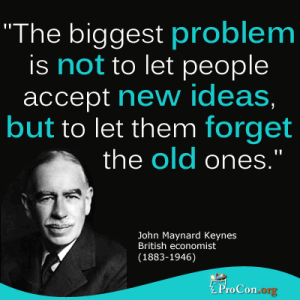 According to the great economist John Maynard Keynes, governments should run surplus budgets in good times so they can pay down the debt they need to run in the bad times. Yet the Canadian government has been running deficits ever since the recession ended in 2010 and Ontario is still three years from getting to a balance. According to the great economist John Maynard Keynes, governments should run surplus budgets in good times so they can pay down the debt they need to run in the bad times. Yet the Canadian government has been running deficits ever since the recession ended in 2010 and Ontario is still three years from getting to a balance.
So the PM has determined that the federal budget, coming down in two weeks, will be accompanied by a spanking new ‘balanced budget’ law. This law, ironically, will mandate the federal government to ‘not do’ what the Harper government ‘has been doing’ for the last four years – running a deficit.
Since the early 1990s most of Canada’s provinces had also enacted balanced budget laws of one kind or another. And since then, almost all of these jurisdictions have either repealed or ignored these unworkable laws. Mike Harris introduced his balanced budget act after running deficits for over half his term in office, and McGuinty repealed the law when he came to power. But McGuinty and Harris each had about the same number of balanced budgets at the end of the day. Quebec, with the worst debt to GDP ratio in the country, has just announced a balanced budget – and this without a new law.
Managing the budget is one of the most important responsibilities for an elected government? Is our PM saying that he can’t be trusted to balance the budget without a new law requiring him to do so? Or is this just a another piece of political gimmickry which he will observe only when it suits. We should recall the ‘fixed elections date’ law which Harper also introduced a number of years ago, then broke, in 2008, when he thought it opportune to try to win an election.
Background links:
Ontario’s Upcoming Budget
Ontario GHG Targets Carbon Tax Ontario Cap and Trade Cap and Trade
Canada’s Emissions Federal Budget Expectations Fed Budget More
Paul Martin on Federal Budget Canada’s High Tech Deficit J.M. Keynes
Balanced Budgets More Balanced Budgets Even More Balanced Budgets
Election Date Law

Ray Rivers writes weekly on both federal and provincial politics, applying his more than 25 years as a federal bureaucrat to his thinking. Rivers was a candidate for provincial office in Burlington where he ran as a Liberal against Cam Jackson in 1995, the year Mike Harris and the Common Sense Revolution swept the province.

 By Pepper Parr By Pepper Parr
April 7, 2015
BURLINGTON, ON
Tom Muir has been a consistent critique of many city council decisions and an advocate for his community – Aldershot.
Greg Woodruff, a generation or two behind Muir, has also been a critic and an advocate for Aldershot.
 Both had comments on some of the ideas that were floated by the Planning department at a recent community meeting in the community. Both had comments on some of the ideas that were floated by the Planning department at a recent community meeting in the community.
The proposed revision” revision said Muir in a note to one of the city planners, “has long been, historically, one of the biggest fears of Aldershot people – policy and wording revisions that can lead to wholesale block-busting and creeping destruction of a prime section of Aldershot character, heritage and history.
While this is technical, Muir sites a section of the Official Plan policy:
Part III. 2.2.3. h) Notwithstanding the policies of Part III, Subsection 2.2.2 d) of this Plan, the lands designated “Residential Medium Density” on the south side of Plains Road, between Cooke Boulevard and Filmandale Road, shall be subject to site-specific zoning regulations designed to protect the existing character of this portion of Plains Road and provide compatibility with the abutting neighbourhood to the south. Any exterior alteration or addition to the property shall maintain the residential appearance and character of the property.
 Recently completed retirement home improves the look of the intersection but brings nothing to the community in terms of a place to go – no public amenities “Changing this wording, and supporting zoning bylaws, so as to remove the requirements for site-specific zoning requirements – “shall” – to protect the existing character, provide compatibility with the abutting neighborhood to the south, and maintain the residential appearance and character of the property, is a sure recipe for just such a future. This is what a majority Aldershot residents have consistently expressed objections to. I live on Townsend Ave., immediately south of these lands.
“If these protections were desirable, warranted, and defensible in the present OP” asks Muir, “then what has changed that makes such protections not so in the present. These lands are certainly not realistically needed to meet any other superseding goals that I can think of. All I can see is that such revisions reward speculation and profiteering.”
“Such wholesale changes I cannot support. Notwithstanding that not all of the properties are equal, how does one choose which to protect and will that be defensible, among many judgemental factors? This is a very slippery slope.
“I think that in short order, given other redevelopments that are already underway on Plains Rd in general, this is exactly what appears will happen following such revisions. I already see signs of this, such as development/real estate companies speculating in properties in the subject section. I don’t want to see a replication of that recent redevelopment form in the subject area.
 Planters along Plains Road have given what used to be a provincial highway a much more suburban look. Hasn’t slowed traffic down enough for most people – except for those who drive through the community. “It will destroy what is left of the low density residential, with some employment or commercial uses mixed in, and with green spaces and mostly attractive streetscapes. It will be replaced by concrete, brick and asphalt right to the street.
This is not an Aldershot Village Vision, but rather a Nightmare looming. This seems to me a critical juncture in the process.
Greg Woodruff, who ran against Gary Carr for the office of Regional Chair – more to have a platform that to win the office asks the politicians to “Stop saving the greenbelt and start saving us.”
Woodruff says he is “in favour of development and smart growth – that is not what is under way in Burlington. We are embarked in the stupidest type of growth seen yet. Let’s review the last several years in Aldershot.
Does the street look slightly nicer with newer buildings – yes.
Trees – less.
Businesses that are open at 7:00 pm – less.
Places for people to work and shop – less.
Dependency on cars – more.
Congestion – more.
 Councillor Craven described the sign that was set up at the western end of his ward as “beautiful”. The result is a kind of “bimbo” street that looks slightly nicer, but is devoid of actual value to residents. This trend is growing and accelerating across Burlington.
In the past developers chewed up cheap farmland and converted it into housing. Now that farm land is off limits they are just doing the same with commercial space. The city has just identified areas that can be redeveloped at the most profit – not areas where intensification makes any sense.
Previously the suburbs spread everything out and made the car king. Now we are moving to large swaths of apartment blocks completely devoid of any local services and placed around roads that were never designed to service so many. This is a far worse situation.
 Greg Woodruff describes much of the development as giving a “kind of “bimbo” look – slightly nicer, but devoid of actual value to residents. This trend is growing and accelerating across Burlington. City planners seem to have settled on religious devotion to a single formula imposed by their provincial masters; more density is better. Seemingly now freed from servicing the wishes of actual residents and backed up with “saving the green belt”; the agenda is to slow boil residents like frogs in water.
Chipping away local greenery tree by tree. Blocking out the sun building by building. Increasing congestion day by day. This is the only future offered to existing residents – endless and perpetual construction, greying and densification. Welcome to the intensification zone.
A better end game is to end up with a much greener and localized city than we started with; that is the point of density. We want larger parks, more restaurants and things to walk to – you can’t make things greener by chopping down trees or get more businesses by putting houses where stores were. Yet that seems what city planners are pitching.
Population density doesn’t solve problems in your community if your community is merrily downgraded into endless apartment blocks. Sorry “Saving the green belt” cannot justify ever worsening living conditions for the rest of us.
Here is how we start turning the current direction around. “Smart growth” is when the increased density brings amenities into the community for the benefit of all – including existing residents.
1) Modify the zoning rules so that when redevelopment occurs the zoning stipulates that amenities come in with the development. In most areas this means high quality commercial space. 45% maximum lot coverage, 45% high quality parking, 10% green. Must have commercial venting and transport truck accesses.
2) A percentage of development fees must go into a fund for new park land – local to the area of development. This will enforce localized services and new localized greenery as redevelopment occurs.
 The only way to secure the “green belt” is to make sure that most people would prefer to live inside the “intensification zone”. This requires a focus on improving the liveability of the areas under intensification. Every development which brings in people without an obvious improvement to the community is negative. The only way to secure the “green belt” is to make sure that most people would prefer to live inside the “intensification zone”. This requires a focus on improving the liveability of the areas under intensification. Every development which brings in people without an obvious improvement to the community is negative.
“Dispense will the endless rationalizations presented by the city” suggests Woodruff. “If a development results in less trees, less shops, more people and more congestion – then the city is developing your area into a grey high density mess.”
The Planning department is in the process of testing ideas and listening to the residents in different communities. The Mayor is gearing up for a talk on intensification – his stab at helping people understand what is taking place.
If what Muir and Woodruff have to say is any indication on how the intensification debate is going to go – we are in for some feisty debate.
Neither of these man could be referred to as uninformed slouches.

 By Ray Rivers By Ray Rivers
April 1, 2015
BURLINGTON, ON
Canada’s former General, Rick Hillier, has struck out at those MP’s who didn’t show up to vote for ‘Harper’s War’ – the resolution extending Canadian bombing of ISIS into Syria. Hillier was the guy who oversaw Canada’s most active role in Afghanistan, so he should know about the costs of war and the value of war’s benefits.
And Harper’s War, like the one his government inherited in Afghanistan, has nothing to do with self-defence, despite our PM’s protestations to the contrary. Although there are potentially all kinds of enemies out there in the shadows, only a fool would believe that ISIS poses an imminent military threat to Canada. We are half a world away. How can they bomb us without an air force or invade us without a navy?
 Canada’s former General, Rick Hillier, has struck out at those MP’s who didn’t show up to vote for ‘Harper’s War’ ISIS is a consequence of GW Bush’s extrajudicial invasion of Iraq in 2003. Yes, that was the war which Mr. Harper believed we needed to also fight. Bush’s people won the war but lost the peace. Or more accurately, they won the battles and lost the war – since peace was never an outcome.
Defeated, demobilized and shut out, Saddam’s political and military organization, the Baathist Sunni party, re-grouped and re-engineered themselves as ISIS, then went to work taking back what Bush had taken away. History shows us how it gets more complicated, in that part of the world, with each new wave of outside intervention. I mean, just ask the Libyans, whom we helped liberate from Gaddafi with our CF-18s, how much they are enjoying their freedom.
Of course ISIS is nasty group of people and I wouldn’t want them as my neighbours – but they’re not. And some of their neighbours are almost as evil as they are. For example, Syria’s dictator Assad has murdered over two hundred thousand of his people, some with chemical weapons. And Iraq’s Shias have done their fair share of slaughtering their Sunni brethren.
ISIS seems to be killing everybody. Iran and the Kurds are fighting ISIS. And once this skirmish is over, Iran and Turkey will be gunning for the Kurds who have long sought their own national state in Iraq, Iran and Turkey. Meanwhile, Turkey, with the largest land army in the area, has refused to fight ISIS unless the US completely obliterates Syria’s Assad.
Syria, supported by Iran, Hezbollah and Russia, is also fighting ISIS and other rebel groups, including al Qaeda and the ones supported by the Americans. The Americans are bombing in Iraq, as we are, but also in Syria, where we are going. But at least the Americans have apparently got some deal, brokered by Russia or Iran, granting them immunity from counter-attack by Assad’s still intact forces, though we haven’t
 ISIS seems to be killing everybody Jordan is also bombing in Iraq and its neighbour and former enemy, Israel, has offered to help should ISIS invade the kingdom. Egypt has gone from dictatorship to Islamic quasi-democracy and back to military quasi-dictatorship, and has been bombing its neighbour, rebel-dominated Libya. Iranian backed rebels have taken over Yemen and are now being bombed by the Saudis, who are in the process of creating a twenty-plus nation pan-Arab army, with America’s blessing.
Israelis may remember, without fondness, the last pan-Arab army, which nearly drove it into the ground during the 1973 Yom Kippur war. We should always be careful what we wish for. And what about Hamas and those west-bank Palestinians, besieged by wave after wave of invading Israeli settlements, and who now know for sure that Israel will never agree to a two-state solution?
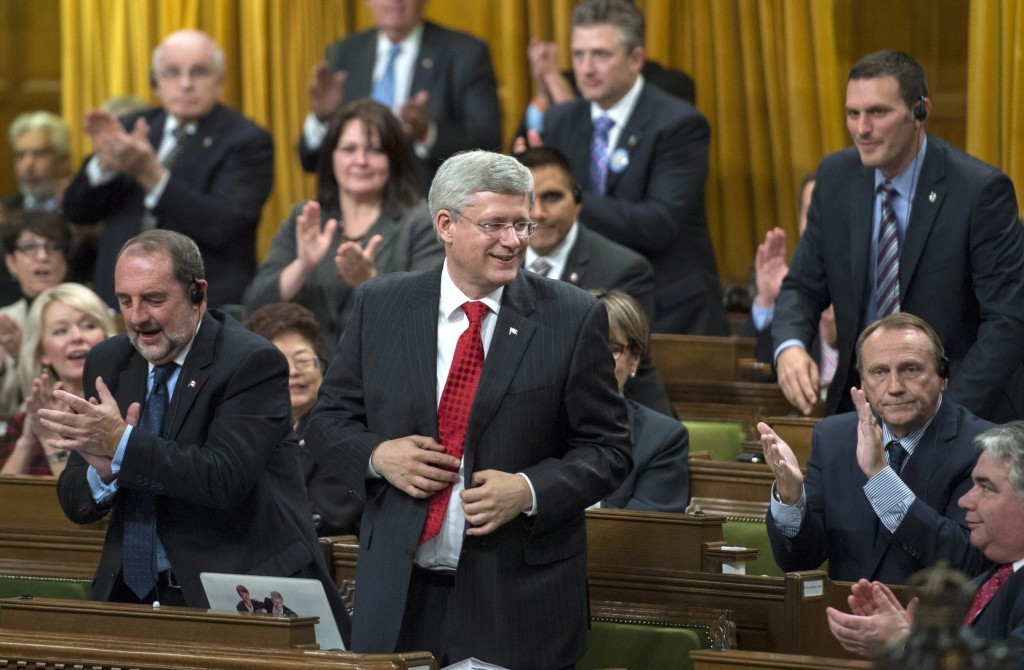 Prime Minister Harper speaking in the |House of Commons during the debate of the the resolution extending Canadian bombing of ISIS into Syria Into this hornets’ nest, Mr. Harper’s government has decided to extend our ISIS bombing mission into Syria, with no military objectives, no timelines and no authority to invade a sovereign state (Syria). Syria used to be a real country in every sense of the word. Even besieged by civil war as it is today, it still has enough powerful high-tech Russian supplied anti-aircraft weapons to take down one, or all, of our CF-18s, if they wanted to.
It’s crazier than a flea circus, and nobody should know that better than former military chief of staff, Hillier. But he is the guy who said “we’re not the public service of Canada. We’re not just another department. We are the Canadian Forces, and our job is to be able to kill people.” Over a hundred of our soldiers died in battle during his watch and our reward is the chaos that still characterizes Afghanistan today.
 Ray Rivers writes weekly on both federal and provincial politics, applying his more than 25 years as a federal bureaucrat to his thinking. Rivers was a candidate for provincial office in Burlington where he ran as a Liberal against Cam Jackson in 1995, the year Mike Harris and the Common Sense Revolution swept the province. Ray Rivers writes weekly on both federal and provincial politics, applying his more than 25 years as a federal bureaucrat to his thinking. Rivers was a candidate for provincial office in Burlington where he ran as a Liberal against Cam Jackson in 1995, the year Mike Harris and the Common Sense Revolution swept the province.
Background links:
Syria’s Moral Maze Injured Soldiers ISIS Alliance Infighting Shaky Ground
Saddam’s Old Party Pan-Arab Army General Hillier’s Anger Rick Hillier

By Pepper Parr
March 31, 2015
BURLINGTON, ON
It does happen – mistakes are made.
You fix them, you apologize and you hope it is the last mistake the staff member makes.
Earlier this week we posted the list of who gets paid more than $100,000 provided by the province’
A staff member started early in the day, downloaded the data and began to format it.
She downloaded the 2013 data by mistake.
It was an observant reader who saw the error.
We scrambled and corrected the mistake.
The corrected numbers can be found here.
This was embarrassing.

 By Ray Rivers By Ray Rivers
March 27, 2015
BURLINGTON, ON
Urban sprawl – it even sounds like a dirty word. Sprawl has gobbled up more potential farm and natural lands than any other form of development.
 Gas and land were cheap and it was the way people wanted top live. It will take several decades to unwind all this urban sprawl – perhaps Burlington could become a leader in the change. Because of the distances involved in servicing subdivisions and the inherent low population densities, sprawl is also the most costly form of development. And sprawl is dependent on the automobile as the primary (or sole) means of transportation, resulting in gridlock and the consequent lengthy commute times.
These downsides were recognized soon after this ‘California’ lifestyle became the dominant form of development in the fifties and sixties. But once adopted, going back was a tough call. There is so much more profit for developers in buying up cheap farm land and converting it to houses, than in expanding housing in existing built-up areas.
Back in the day, before immigration swelled our urban envelope, most of us hardly thought twice about the suite of problems associated with these ‘burbs’ popping out all around us. But Ontario’s Premier Bill Davis did. He, no doubt, had observed what had been happening to the US rust-belt cities, as suburban development swallowed up prime farm land and hollowed out the inner city core in the process, until nobody wanted to live downtown anymore.
So as early as the 70’s the Davis government sought to keep Ontario’s canvas painted more green than black. Putting an end to paving paradise and putting up more parking lots, as the folk singer Joni Mitchell had warned, was a timely ambition. So he undertook to create Ontario’s first greenbelt, setting out the Niagara Escarpment Commission to ensure protection from development.
 Bill Davis made decisions while he was Premier that made possible the protection of the environment that is being done now. And Davis didn’t stop there, he established the most advanced municipal planning system in North America. To help implement the system, he created new higher-tier regional governments to implement broad scale regional plans, which would permit stable and progressive development over a generation, while protecting farm and natural lands.
But it didn’t really work. The development industry is a powerful lobby and whether through their persistence at council meetings, campaign contributions for municipal candidates or sound arguments, they have been able to sway many development decisions in their favour – decisions that always involve more sprawl development.
And regional plans themselves became a catalyst for accelerated development. Once a land parcel was designated, developers pushed for early approvals in order to get their money out of the projects. And if that didn’t work there was always an appeal to the Ontario Municipal Board (OMB).
The OMB is a quasi-judicial institution which is an anomaly in Canada. Composed of political appointees, this unaccountable body acts as both judge and jury, and frequently overrides the authority of our elected representatives, making a mockery of municipal democracy. The Canadian Senate comes to mind, except that the OMB has real power.
In the end Ontario, with its fancy planning system ended up with about as much urban sprawl as did the bordering US jurisdictions with their more basic laissez-faire systems of municipal planning. It turns out politics, not planning, was at the heart of the issue.
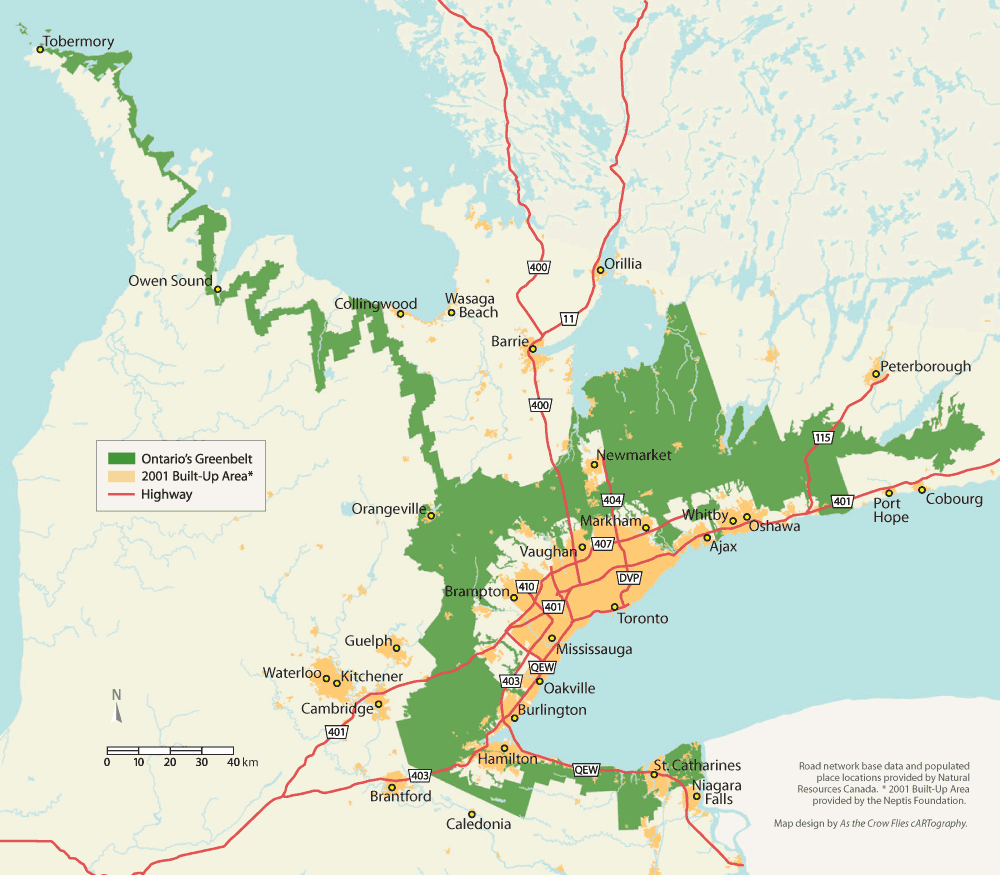 The Greenbelt – in place as a boundary to protect natural space My Conservative friends would prefer to remember Dalton McGuinty for the unfortunate billion dollar gas plant fiasco of a few years ago. But history will record the creation of Ontario’s current Greenbelt as one of his greatest achievements. Following the visionary lead of Mr. Davis, three decades before him, this is the single most important instrument the province now has to hold back the forces of urban sprawl.
Of course, even this initiative could not quash those development plans already underway, such as the ones which have transformed Milton into the textbook case of what not to do. The recent orgy of development there has transformed the once quaint town such that it is now unrecognizable. And as anyone driving on the 401 will attest, this development has also made the roadways largely impassable.
Last week I attended a meeting in Milton, sponsored by the Friends of the Greenbelt. The topic was preserving prime agricultural land and the meeting was well attended by urban planners, farmers and other business people, keen on making their thoughts known.. Listed below are links to other sessions in which the public can have their say on the Greenbelt and its future in Ontario.
Whether you are a farmer concerned about city-folk moving next door and then complaining about your hog operation; a nature-lover craving more opportunity for environmental diversity; or a developer wanting to build more houses on a farm you have just purchased, this is your chance to have your say.
Of course I drove to the meeting, but I did take the backroads to avoid sitting on that parking lot we call the 401. And there you have it – this time using the automobile to fight against urban sprawl.
 Ray Rivers writes weekly on both federal and provincial politics, applying his more than 25 years as a federal bureaucrat to his thinking. Rivers was a candidate for provincial office in Burlington where he ran as a Liberal against Cam Jackson in 1995, the year Mike Harris and the Common Sense Revolution swept the province. Ray Rivers writes weekly on both federal and provincial politics, applying his more than 25 years as a federal bureaucrat to his thinking. Rivers was a candidate for provincial office in Burlington where he ran as a Liberal against Cam Jackson in 1995, the year Mike Harris and the Common Sense Revolution swept the province.
Background links:
Premier Davis
State of the Lakes Ecosystem Conference
Provincial Policy Statement
Greenbelt
The Greenbelt Review
Greenbelt Events

 By Pepper Parr By Pepper Parr
March 23, 2015
BURLINGTON, ON
There are a couple of cardinal rules in the way people in positions of some authority must conduct themselves.
One of those rules is that you cannot have a personal relationship with a person that you have or can be thought to have some authority over. Another is that one cannot be abusive in their behaviour to people that report to them
 There is a situation on city council where the first cardinal rule has not been observed. At the least it calls for a discussion between the member of council and the city solicitor on what the rules are and how they are to be observed. Some have asked: Is there not a code of conduct? Apparently not – quite why one needs a code to regulate decency is beyond me. There is a situation on city council where the first cardinal rule has not been observed. At the least it calls for a discussion between the member of council and the city solicitor on what the rules are and how they are to be observed. Some have asked: Is there not a code of conduct? Apparently not – quite why one needs a code to regulate decency is beyond me.
A staff member’s integrity has been compromised and perhaps the trajectory of their career shortened.
The public looks for integrity and character from their elected leaders. We expect them to reflect the values of the community.
When they don’t there does not appear to be any redress.
There is a situation at the Seniors’ Centre where the behavior of a volunteer has and is making life close to intolerable for city staff.
The public has a right to expect nothing but professional service from the people employed by the city. There are very few instances of unprofessional behavior – those that do crop up are dealt with quickly and expeditiously.
 The city administration doesn’t have the same authority with volunteers. Investigations can take place and copies of reports made available to the offending party. But it is up to the members of the Seniors’ community to police themselves and set out the standard they want to see met. The city administration doesn’t have the same authority with volunteers. Investigations can take place and copies of reports made available to the offending party. But it is up to the members of the Seniors’ community to police themselves and set out the standard they want to see met.
If you don’t like what you see – stand up and say something.

 By Ray Rivers By Ray Rivers
March20, 2015
BURLINGTON, ON
It’s not new – this debate about that piece of face-cloth some women have to wear when they leave their domiciles. Canada’s immigration minister had ordered up veil-free citizenship services a couple of years ago, but a court had overruled him. So while the federal government is appealing the ruling, our PM has jumped in with both feet, calling the ‘niqab’ anti-woman, baiting the opposition, and driving up the volume as we move forward to this year’s election.
 Is this an acceptable form of identification? And why was this ever such a big deal? Isn’t becoming a citizen a prelude to being able to hold a Canadian passport? As with a drivers’ licence or a health-care card, don’t passport requirements include a full-face photo. That means that if the new citizen wants only to be able to travel, she’d need to drop her veil at least twice – once to get the photo and again to board the plane, so what is the big deal at the citizenship office.
On the other hand there is no longer a debate in France. Wearing the ‘niqab’ (or the even more extreme ‘burka’) in public places was banned outright a few years ago. And Quebec’s PQ government was ready to follow that European country’s lead before they were toppled by the provincial Liberals last year. Banning the public display of a cultural icon might be seen as racist under most definitions of the term, but the French law has withstood scrutiny by the European Commission.
While I’m pretty cool with how anyone decides to dress, I’d be a little uncomfortable boarding a plane knowing that another passenger boarded without a confirmation of her facial identity. So perhaps the PM came to the right conclusion but for the wrong reason.
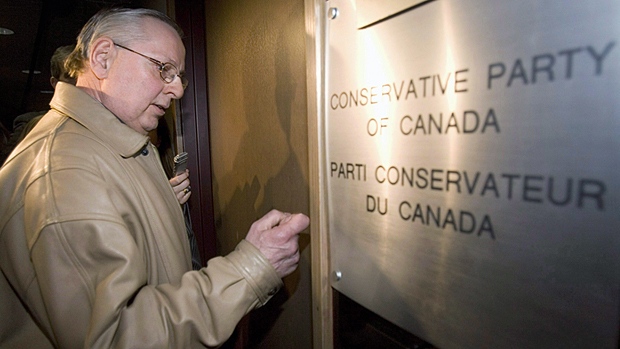 Election Canada official raiding the Conservative Part offices in Ottawa – just politics? Or maybe he’s just playing politics. And who could blame him for looking for diversions. First of all he wants to extend the ISIS mission, even into Syria, and that smells like an invasion. But even worse, this decision is being made just as we’re putting to rest one of our own – a military trainer – supposedly not involved in direct conflict, but who was killed while serving on the front line.
And then, having jumped the gun and announced an income-splitting tax break for the wealthy, the PM now finds himself unable to afford it. His promised election year balanced budget is evaporating faster than the price of oil and the Canadian dollar are falling. So the PM is stalling, hoping and waiting for a miracle.
But Harper doesn’t need a miracle, he is a shrewd tactician and knows that there is no defence like an offence. And what could be more offensive than attacking new Canadians for their little cultural niceties which most of us don’t really even want to understand. If the ‘niqab’ is anti-woman, what does that say about the person wearing the garb?
 Prime Minister Stephen Harper expounding on a policy. And then there is this recent gun narrative in which the PM seemed to be telling folks to go ahead and use your guns instead of waiting for the police. If this was a message to his base, or a call for funding from the gun organizations and companies, you can bet it worked. And then just to placate those nervous 905’ers, he now claims he was mis-interpreted. It’s an old trick, and he is performing it brilliantly.
Had his new anti-terrorist act, Bill C-51, been the law of the land, the recent terrorist scenarios we experienced would still have taken place The bill is a Trojan-horse, an excuse for the government’s security failures. It is disguised as an anti-terrorism weapon, but is really just another roadblock to freedom of expression and the curtailment of other civil liberties. The right-wing generally sees itself as a strong advocate of free speech… but then it really depends on what is being said, doesn’t it?
So what is next on the PM’s offensive agenda. So far he has stayed away from capital punishment and a woman’s right to choose. Indeed he has been consistent in dodging these topics, despite the pressure he must be getting from some of the really regressive members of his party and caucus.
 The French banned skinny models appearing at fashion shows – they also banned certain types of head dress. Is Canada going to restrict what people can wear at public events? Should a full face be revealed for the purposes of identification when boarding an aircraft or appearing in a court room? So perhaps he might want to try something completely different. The French seem to have settled on going after super-skinny models for their next social mission. Banning them from fashion shows and off the runways until they ‘fatten-up’. Of course this might just be a ploy to reduce the huge quantity of surplus French agricultural produce. I wonder if that would also work here to help out oil-depressed Alberta and Saskatchewan.
 Ray Rivers writes weekly on both federal and provincial politics, applying his more than 25 years as a federal bureaucrat to his thinking. Rivers was a candidate for provincial office in Burlington where he ran as a Liberal against Cam Jackson in 1995, the year Mike Harris and the Common Sense Revolution swept the province. Ray Rivers writes weekly on both federal and provincial politics, applying his more than 25 years as a federal bureaucrat to his thinking. Rivers was a candidate for provincial office in Burlington where he ran as a Liberal against Cam Jackson in 1995, the year Mike Harris and the Common Sense Revolution swept the province.
Background links:
Passport Requirements French Ban Harper’s Rant
More Harper’s Rant Harper and Guns Super-Skinny

 By Ray Rivers By Ray Rivers
March 11, 2015
BURLINGTON, ON
Is Bill C-51, Canada’s proposed new ‘anti-terrorism’ legislation, more onerous than the government’s Emergencies Act ( formerly War Measures Act)?
Some readers will recall the controversy when Former PM Trudeau introduced this instrument, back in 1970, to quell the terrorist threat posed by Quebec separatists. Well, at least one civil rights organization in the country is putting it in those terms.
 The question this new legislation begs is how many civil liberties are we prepared to surrender in the hope that the mitigative measures, specified in this bill, will prevent potential acts of terror. Yet perhaps the real question is whether these new measures will make much of a difference at all. Bluntly put, is moving towards a police state the most effective approach to dealing with the seeds and buds of the kind of discontent that motivates an individual, or group, to strike out violently against fellow Canadians? The question this new legislation begs is how many civil liberties are we prepared to surrender in the hope that the mitigative measures, specified in this bill, will prevent potential acts of terror. Yet perhaps the real question is whether these new measures will make much of a difference at all. Bluntly put, is moving towards a police state the most effective approach to dealing with the seeds and buds of the kind of discontent that motivates an individual, or group, to strike out violently against fellow Canadians?
Take Parliament shooter, Zehaf-Bibeau, whose actions have led to this bill, though it wasn’t the first time someone had tried to commit an act of terror on the Hill. Still, his gunfire did force a sitting PM, for the first time in history, to take refuge in a closet. And what about the hunting rifle he used? Nobody seems to know because the PM had abolished the long gun registry some years ago.
 The RCMP have defined Zehaf-Bibeau as a terrorist. Here he is seen running into the House of Commons where he was killed minutes later. Oh the sad irony of it all. First the government kills the registry over a few complaints concerning the right to gun owners’ privacy. And now, the government introduces draconian rules that reduce all of our civil liberties, because of a crime committed with an unregistered gun.
And would the police have been able to stop either Zehaf-Bibeau or Couture-Rouleau, (who ran down soldiers in Quebec) had they been equipped with the new powers given in C-51? Both of these men were already well-known to authorities. And yet neither could not be kept in detention forever, even with this new law.
Nobody said that building a multi-cultural society would be easy. Each new strand of diversity necessarily brings with it some baggage, whether that be an historic Irish Catholic/Orange squabble, anti-Semitism or Islamic terrorism. In the latter case, world events, and especially the emergence of this barbaric ISIS, who have created a creed of terror out of a religion of peace, has made Canadians wary.
So perhaps that is where the government should start the process of keeping us safe. But preventative measures such as education and the establishment of cross-cultural linkages are not on the cards in this bill or in anything else this government is considering. Instead we see greater powers of surveillance, police detention and censorship – the kind of restrictive measures we want to criticize other nations for deploying.
And greater censorship of the airways (internet) has broader implications, particularly when we observe the absence of any provision in the bill for meaningful oversight. It seems that judges and ministers of government, rather than Parliament, will call the shots and do the accounting. The executive excluding the legislative arm of government from oversight, in political lingo, is a dangerous departure for a free and open society.
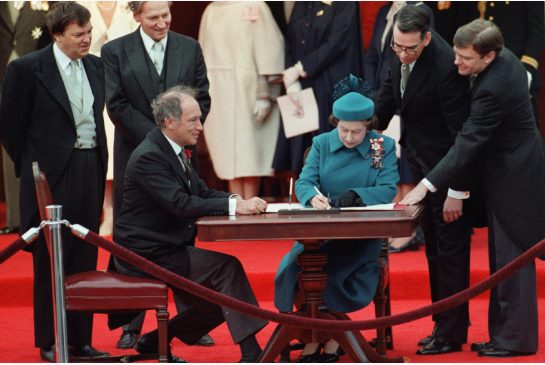 Queen Elizabeth II signing the Canadian Charter of Rights and Freedoms. Does one lone-wolf terrorist Justino the close to wholesale loss of basic rights without significant oversight? Or is this a ploy to frighten citizens and win an election? It’s been done before. The NDP would scrap this bill if elected and the Liberals, hoping to diffuse a potential Tory campaign issue, will support its passage. But Mr. Trudeau has promised, if elected, to alter the law to make it better subscribe to our Charter of Rights and less likely to suffer a challenge at the Supreme Court. But then, this PM and his minister of justice seem to dwell in their on-going irreverence for the highest court in the land. It is as if they, themselves, have subsumed that role.
In the end, the government will pass this law with or without the support of the other parties. And while everyone agrees that we need to do more to prevent the kinds of terrorist activities we’ve seen recently, the harshest criticism may be that just ramming in new police measures to quell terrorism is simply not doing enough to keep us safe.

Ray Rivers writes weekly on both federal and provincial politics, applying his more than 25 years as a federal bureaucrat to his thinking. Rivers was a candidate for provincial office in Burlington where he ran as a Liberal against Cam Jackson in 1995, the year Mike Harris and the Common Sense Revolution swept the province.
Background links
War Measures Act Better? Anti-Terrorism Act Bill C-51 B.C. Concerns
Defending the Bill Totalitarianism? Censorship Big Data
Dangerous Legislation Parliament Shooter Soldier Attack

 By Staff By Staff
March 10, 2015
BURLINGTON, ON
The province recently announced changes it wants to make to the Planning Act and the way Development charges are to be implemented.
Everything the city does in the Planning and Building department is impacted by these changes – getting the views of the Bruce Krushelnicki, the city’s director of |Planning then are useful – what does he think this is going to mean?
“Of course this is a Provincial legislative proposal and will be the subject of wide review and debate. This will I am sure, evoke an important conversation, one that has been expected for some time following the announcement last year that the Planning Act was undergoing a scoped review.
My initial comment is that there is a lot more detail necessary before we can understand the impact of the changes that are proposed. The note identifies a “stakeholder working group” that will assist in implementing some of these changes, so the details may be some time yet in coming.
The proposed changes that would enhance public engagement are welcomed and I look forward to some additional information about the proposed “community permit planning system”. Planning Advisory Committees – which can even now include citizen membership – have been part of the Planning Act for many years and I await the details regarding the changes that are proposed. It appears that when such committees are formed, citizen membership may be required.
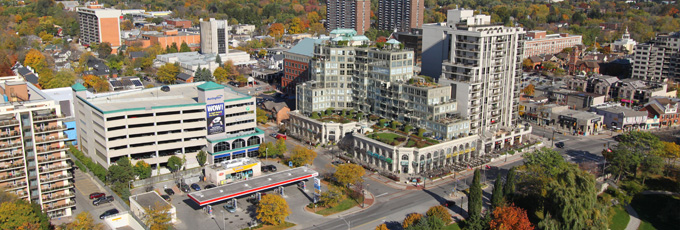 What will the revisions to the Planning Act mean to citizen input on what gets built? The change to a ten-year review requirement for Official Plans is very welcomed. When the Act was revised some time ago, the previously optional five year review was made a mandatory requirement. As Official Plans have become more complex, the five year review (including OMB appeals) was often scarcely completed when a new review would commence. Some in the planning profession expressed concerns that plans were almost constantly under review. Some argue that this has resulted in a lack of stability in the policy framework. This may be intended to address this concern.
Providing more stability over planning documents addresses the concern expressed by some that it is too easy to apply for amendments and if unsuccessful, too easy to appeal an Official Plan, even one that has been recently approved. The two year moratorium on private appeals as they are called – that is appeals lodged by persons when an private application for amendment is refused or ignored – means that councils can expect their plans to remain unchallenged for a period of time.
According to the proposal as described, a council will nevertheless be able to amend their Official Plan on their own initiative.
The proposal also seeks to remove the opportunity to appeal some issues to the OMB. Removing appeal opportunities cuts both ways. That is, appeals can be made by citizens against a decision of council and appeals can also be made by developers against a decision of council. How appeal opportunities for all parties will be affected will be important to learn as details become known.
 What will any Development Charge changes mean to the cost of housing? It is also proposed that more clarity will be provided in determining what constitutes a minor variance to the zoning by-law. Minor variances are decided by the Committee of Adjustment, an independent body appointed by council.
Currently there are four long standing “tests” for a minor variance. Presumably the criteria for approval by the Committee will be clarified by the stakeholder working group. This is yet another is area where much more information is need before the implications can be assessed.”
This process of revising two very significant pieces of legislation has clearly just begun.

 By James Smith By James Smith
March 7, 2015
BURLINGTON, ON
Sometimes, little noticed somewhat boring announcements by government are the ones that pack the biggest punch. Yesterday’s announcement by Minister Ted McMeekin that Ontario intends change to how we’ll plan, build, and pay for developing cities in Ontario is one such announcement.
The way Ontario is built and developed is about to change; I think this will be a very welcome. First let me declare my bias, I’m a Founding Member of BFast (Burlington for Accessible Sustainable Transit), and as a design consultant I often work on projects for both public and private developers. I feel the changes announced by Minister McMeekin yesterday may mean modestly more work for me and my clients.
If these changes live up to the billing, changes to Smart Growth, land use planning and development charges have the potential to be a seismic shift on how cities are built for years to come and this affects us all. The coming changes will radically impact how we go about urban growth in Ontario on a scale as large as the introduction, ten years ago, of The Green Belt. If the legislation lives up to the press release, the Province will put teeth into its Smart Growth policy and Municipalities will need to pull their weight.
So far Smart Growth is a policy many municipalities, including Burlington, give just lip service. Professional planners and drafters of Official Plans write elegant documents, but City and Town Councils frequently ignore their more lofty goals. With this legislation Minister McMeekin is saying Municipalities will be held to account, and will need to live up to the Goals of Smart Growth. Long overdue.
 This change is about the kind of building projects we’ll see built in Ontario and how we will pay for the stuff we build. I suspect that members of Burlington and other City councils who subscribe to the failed dogma of Libertarianism won’t like this legislation one bit. To them I say: “suck it up princess, the free ride is over”. Specifically these Planning Act Changes propose to: This change is about the kind of building projects we’ll see built in Ontario and how we will pay for the stuff we build. I suspect that members of Burlington and other City councils who subscribe to the failed dogma of Libertarianism won’t like this legislation one bit. To them I say: “suck it up princess, the free ride is over”. Specifically these Planning Act Changes propose to:
• Ensure residents are better consulted at the beginning of the planning process for new developments.
• Encourage residents to provide feedback on the future of their communities.
• Help municipalities resolve potential planning disputes earlier, reducing involvement of the Ontario Municipal Board in local disputes.
• Extend the review of new municipal official plans to 10 years, instead of the current five-year cycle
• Providing municipalities with more control and stability over their planning documents. Once a municipality establishes a new official plan, it would be frozen and therefore not subject to new appeals for two years unless changes are initiated by the municipality. A community planning permit system once established by a municipality would not be subject to any appeals of private applications for five years.
• Clearly defining what constitutes a minor variance (a small change from a zoning bylaw).
Better consultation with residents early in the development process and getting their feedback are welcome, long overdue changes. The challenge will be to break down the walls of NIBYism; no small task. For at least seventy years North America has embraced suburban sprawl funded by, more sprawl.
Leigh Gallagher, in her book The End Of The Suburbs outlines how North Americans have the car-centric suburban landscape in their DNA and is our expectation of where we live. Both Gallagher and Smart Growth talk about breaking this unsustainable cycle. The proposed changes to the Act will have to help with this understanding of what Smart Growth means, so residents will need to understand this shift when proposals are brought forward. As, or more importantly, the development industry will have to change their business model too.
 Six houses identical to this one were torn down on land that was part of the Veterans Land program – the lots were assembled and the infill shown below built. Boilerplate infill projects will no longer be acceptable. Projects will more and more have to reflect an individual neighbourhood’s character and residents taste and long-term expectations for their community. Budgets for new projects will therefor need to change as removing the hated OMB from most planning disputes will mean more money being spent on public meetings and Architects’ fees and less time on Lawyers’ fees. In my experience, anytime more thought goes into a design and less time is spent on legal wrangling makes for a better project.
 Fifty eight units were built on land that previously had six homes on it. Tough to find a back yard in this infill project. The ten year cycle for Official Plans has potential positive benefits as it will reduce the time Cities and Towns spend on Official Plans and free up those staff resources. No only is limiting the involvement of the OMB of great news, these changes will mean fewer Municipalities, will do their city planning by Official Plan Amendments. Burlington specifically has for at least 25 years engaged in planning by Official Plan Amendments rather than relying on either the Regional or City’s Official Plan. Councils often are blinded by developments that have actually cost the Municipality money in the long run as the Official Plan Amendments often is at odds with the official plan, these changes will force the Development industry to do better planning, spend more on Designers and less on Lawyers.
Development Charges are set to be changed in the following fashion:
• Help municipalities recover costs for transit services and waste diversion.
• Create clear reporting requirements for capital projects municipalities financed though development charges, as well as section 37 of the Planning Act related to density bonusing and parkland dedication.
• Municipalities would be required to follow reporting requirements that reflect best practices and detail to the community how money from development charges is spent.
• The government would create better reporting requirements for municipalities collecting money under section 37 of the Planning Act related to density bonusing, and related to parkland dedications, which details how the funds are spent.
• Development charges would be payable at the time the first building permit was issued for a building so that developers could be certain of the cost.
• Municipalities would be required to better integrate how development charges fit with long-term planning, including local asset management plans.
• The government will help municipalities identify and share their best practices on using development charges to address local planning and financial objectives.
• There would be more stringent reporting and greater oversight of any funds or municipal charges on new developments that fall outside what is allowed in current legislation
Development Charges can be a useful tool to reflect the real capital costs of any building project on a municipality. Planner Pamela Blais in Perverse Cities clearly outlines that the real cost to the municipal taxpayer of urban sprawl is not presently accounted for in many North American jurisdictions. Development Charges attempt to make a project pay for the real cost of the capital costs a new project represents.
While Transit and Waste diversion were not specifically accounted for in the previous Act they can be funded under more general categories. Specifically calling these items out is a good step. The challenge will be to use Development Charges to limit Greenfield, or make it pay for the burden it puts on a Municipality while simultaneously not acting as a brake on positive and creative infill development.
So there needs to be the ability for Municipalities to bracket Development Charges accordingly.

 By Ray Rivers By Ray Rivers
March 7, 2015
BURLINGTON, ON
Ontario’s minister of the environment. Glen Murray, might have chosen a better winter. He has announced province-wide climate change consultations as a prelude to developing a new strategy. But after the coldest winter in ages he may well get a cool reception from folks who haven’t warmed up to the difference between weather and climate.
The Province has released a discussion paper as a starting point for consultations. This is one of those primers on the topic – a sort of ‘climate-change-for-dummies’. It is more style than substance, to be sure, but the paper does crawl up to a bottom line. A carbon tax is on the horizon for Ontario!
 There is a direct connection between this picture and the one on the right.  What does a person who cares about the environment and is prepared to pay to preserve the plant we live on do to keep the northern environment? Carbon taxes are anathema to our federal government. We recall how Mr. Harper shredded Liberal leader Dion for making a carbon tax the centerpiece of his election campaign a few years ago. And Harper, we know, had spent his earlier days as a climate change denier, though today, as PM, he has to give some lip service to the phenomenon. Besides he is the man who has never seen a tax he liked.
But that isn’t how the nation’s provincial jurisdictions see it. Gordon Campbell may have come from the same place as Harper when he first came into power in B.C. several years ago, but he quickly came to understand the issue. Performing an almost perfect 180 degree back-flip, his government became seriously committed to the environment, and climate change in particular. And the centerpiece of his program was a ‘revenue neutral’ carbon tax. In turn, the B.C. public has vindicated his decision and endorsed the tax by supporting the Liberals at the polls.
Quebec also has a carbon tax and Alberta has a ‘cap-and-trade’ emissions trading regime, which works as a kind-of carbon tax. Ontario has been toying with the idea of joining a couple of US state-led emissions trading initiatives, or starting its own emission trading program. But unlike some other provinces, Ontario is still standing by the water’s edge with one foot in the water in this regard.
Not that anyone should dare criticize Ontario for lack of action. The province didn’t need a carbon tax or cap-and-trade program to score the most impressive GHG reductions in North America. While emissions have increased in most of the other provinces, and soared in Alberta, Ontario’s emissions plummeted to 6% below its 1990 levels. Had every other province followed Ontario’s lead, Canada would have been able to meet its Kyoto international obligations instead of throwing up our hands and becoming the first nation to withdraw from the global treaty.
If you can’t get the puck into the net you might try moving the goal posts. That has been Canada’s approach to defending climate change inaction with this PM, who, in fact, has a book on hockey to his name. But moving the milestones to 2007 just makes Ontario’s performance look better with an impressive 17% reduction.
So if Ontario is already the most valuable player in the league, why do we need a carbon tax? Cynics might speculate that the provincial government is just looking for a new ‘cash cow’ to reduce the provincial deficit and debt. And as to a new tax – well it’s a bit like Molière’s ‘bourgeois gentilhomme’, who striving to become a gentleman and speak in prose, finally realizes that he’d been speaking it all his life.
For example, our healthy electricity rates reflect the shift away from lower cost dirty coal. Isn’t that a carbon tax by another name. And aren’t the HST and federal excise tax, charged per litre at the petrol pump, just a carbon tax by another name? How would a new carbon tax be any different? In the end B.C. and Quebec’s fancy carbon taxes amounted to not much more than jacking up consumer costs at the pump.
 It might be a nice photograph – but it is not by any stretch of the imagination a pretty picture. The theory behind the carbon tax is that it dis-incents the use of fossil fuels, and the consequent release of emissions. Sales taxes are consumption taxes. They discourage consumption so they are good tools from that perspective, as we have seen with declining tobacco sales. But sales taxes, like the HST, are not without their consequences.
It’s called the income effect. Consumption taxes hurt lower income tax payers more that those who are well endowed. This inequity has earned sales taxes, also called indirect taxes, the title of ‘regressive’ as opposed to ‘progressive’ – which is what economists call income or inheritance taxes. Progressive taxes are more socially equitable since one pays taxes in keeping with one’s ability to pay.
B.C.’s effort at ‘revenue neutrality’ trades off consumption taxes for income taxes and inevitably hurts lower income residents, notwithstanding its overall popularity. Those wondering why the wealth spread between the rich and the poor in this country has sky-rocketed over the last couple of decades need only to look at Brian Mulroney’s trade-off between introducing the GST and reducing progressive income taxation.
For a carbon tax to be effective, there need to be alternatives to fossil fuels. The public needs to have the means to shift to public transportation and/or afford and accept the myriad of emerging electric and hybrid vehicles. Further, any such tax has to be big enough to catch people’s attention, so they’ll seriously consider making the shift from the status quo. Otherwise they might as well continue driving that guzzler, grumbling about the high costs and voting for the other political party at the next election.
Having been cultured for over two decades on the evils of taxation, Ontario residents can be expected to resist the imposition of a new carbon tax. However B.C. has shown that making the the new tax revenue-neutral can induce public acceptance. And this acceptability can be enhanced by demonstrating that the proceeds of the tax have been applied to furthering emissions reductions, not simply taken as another tax grab to get dumped into the provincial treasury.
It is not everyday that a government anticipating a new tax, invites broad public participation in helping it make that decision. The links below include access to the discussion paper as well as other background. It behooves us to respond to this invitation by the Wynne government, a government that has shown itself to be inclined to action, rather than just philosophizing.
Climate change is a serious matter with potentially dangerous outcomes, regardless of how much today’s weather may have seduced us into inertia. We owe it to the next generation to participate.

Ray Rivers writes weekly on both federal and provincial politics, applying his more than 25 years as a federal bureaucrat to his thinking. Rivers was a candidate for provincial office in Burlington where he ran as a Liberal against Cam Jackson in 1995, the year Mike Harris and the Common Sense Revolution swept the province.
Background links:
Climate Change Consultations Climate Change Paper Carbon Tax
Carbon Tax and Keystone Quebec’s Carbon Tax More Carbon Tax –
Fuel Taxes Moliere

 By Tom Muir By Tom Muir
March 6, 2015
BURLINGTON,ON
Hard to disagree that the present delegation process isn’t much of an accountability mechanism, but nobody ever said it was easy. What you seem to suggest is giving up. Apathy is how we got to where we are.
The point is that you can delegate and say whatever you want, and demand answers in the Council chambers. You can raise an issue and target a Councillor or whoever as the wrongdoer. You can band together and make a louder noise. You can’t do that at any other level of government.
Keep in mind that a lot of Council business is repetitive and officially mandated by law. It’s not always a big deal that creates issues that arouse people.
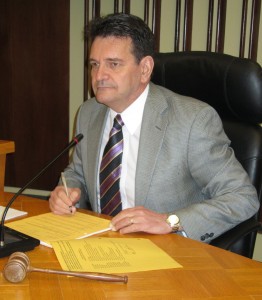 As a Standing Committee chair, Ward 1 Councillor Rick Craven WAS as good as it gets. Handling delegations and accepting the ideas of other people – not as good. But he wins elections. Craven and Tom Muir tangle frequently. It’s these controversial issues where you can publicly call out the Mayor, Council, or Councillors, whoever you see as the guilty party. Gang up on them with your fellows.
What we really need is the major press and media to get involved in a bigger way. The Gazette here is really the only voice on what goes on at City Hall, in an otherwise large vacuum. The other media are part of the lack of accountability.
You either get in the citizen boat and row, or drown.
William James, the philosopher, once said, “Act as if what you are doing makes a difference – it does.”
Tom Muir is an Aldershot resident who has delegated frequently at city hall – he doesn’t back down. He commented on the delegation process in Burlington. Click on the link

 By Mark Gillies By Mark Gillies
March 5, 2015
BURLINGTON, ON
Part two of a four part feature
 John Waldie spent most of his time in Toronto during 1886 preparing to create his biggest business venture to date. John Waldie spent most of his time in Toronto during 1886 preparing to create his biggest business venture to date.
 The historic home called “Erin” was purchased as a wedding present for his second wife, Sarah Ann Jarvis. Sarah was to become the stepmother to John’s 13 children. While John Waldie was in Toronto, the family stayed in Burlington until John was ready to move his family into “Glenhurst”, the first mansion built in Rosedale. John, a widower for one year, had just remarried December 16, 1885 to Sarah Ann Jarvis, and almost immediately, he went to Toronto by himself to start his new company leaving Sarah in Burlington with his 13 children. As a wedding present, John had purchased “Erin”, a home for Sarah at 3265 Mayfair Place in Burlington. Sarah was to care for the children at this home until it was time to have them all move to Toronto.
On November 20, 1886, the Victoria Harbour Lumber Company was incorporated. John had purchased a failing sawmill in Victoria Harbour named Kean, Fowlie and Company. The former company had gone through rough times and were unable to continue.
The Victoria Harbour Lumber Company grew and prospered under the management of John Waldie. In order to make the business successful, it was necessary to create a village for the employees. The area was fairly remote at the time. Streets were laid out, and in 1888 construction began on buildings and houses.
 To make the Victoria Harbour Lumber Company successful, John Waldie built most of the town, enabling his employees to live and work locally. The general store was a company store, owned and operated by the Victoria Harbour Lumber Company.  Fortunately for John Waldie, the Grand Trunk Railway built a train station in Victoria Harbour. The location was ideal, as it was right across the road from his sawmills. The station was used to transport logs into Victoria Harbour, and to ship finished cut lumber out of the community. The Grand Trunk Railway had arrived and built their own train station. John Waldie built a general store. He had more than enough experience on how to build and run a successful general store, having purchased his first in Wellington Square when he was just 22 years of age. John had a second store built in Wellington Square, and it is still there to this day, at the northeast corner of Lakeshore and John Street.
 John Waldie built a library for the residents of Victoria Harbour and furnished it with books, just as he had done for Burlington. Pic: St. Paul’s Presbyterian Church John, always an avid believer in reading made sure that they built a library for the residences of Victoria Harbour. It was a beautiful facility, and is still in the village to this day, as well as the general store.
 John Waldie was a Presbyterian. He financed the construction of St. Paul’s Presbyterian Church in Victoria Harbour. The church opened in 1906. Waldie, a devout religious man, built St Paul’s Presbyterian Church in 1906 for this little hamlet. The church is still functional to this day.
 This rare aerial view of Victoria Harbour was how the village looked around 1920. The intersection of William & Albert Streets is at the top and in the middle of the photograph. In the background, you can see the three mills, the log booms in the bay, the Grand Trunk Railway station to the upper left, railway box cars are to the upper right, the General Store and Library are across the street from each other on either side of the main intersection. If you’re going to have all these buildings for your employees, then you better have houses for them. John set out to build most of the houses in Victoria Harbour. They were small, but efficient. The houses had an early nickname, and were called “saltboxes”, but that went by the wayside when John had the houses painted in the company’s colours of white and yellow. The trim was white and the exterior walls were yellow. The new nickname was “canary houses”, and many are still referred by that name today.
 Once the logs had been cut, they were transferred to the planing mill. Here they were prepared into a finished product.  Victoria Harbour Lumber Company consisted of three sawmills: Mill #1 & planing mill; Mill #2, and Mill l#3. Workers poured in from all over Canada, the United States and Europe eager to work at the Victoria Harbour Lumber Company. There were three mills at the water’s edge, and they were kept busy, sawing and planing lumber. Timber was brought to the mills from all around the Muskoka area, even as far north as Sudbury and North Bay. The railway brought some logs and so did the ships. Logs were also floated to the mills from many different locations. Upon arrival to the mills logs were kept in the water with huge booms, and were dragged to the mills when ready to cut. The finished lumber was then loaded in to railway boxcars or ships and sent to their destination.
 Ships provided a second option to transport logs and finished lumber. The Victoria Harbour Lumber Company utilized both ships and rail for their products. The tiny hamlet of Victoria Harbour with about 200 dedicated workers at the Victoria Harbour Lumber Company had made John Waldie the second wealthiest lumber baron in Canada by the turn of the 20th century, in just over 20 years.
My next article will be a continuation on the wealthy philanthropist, John Waldie and his family. Whatever happened to his 13 children, some lives ending in tragedy? What happened to John’s two wives? Find out next time.
Mark Gillies is a lifelong resident of Burlington, who grew up in Aldershot and developed as a local historian, researcher, master genealogist and writer who has a passionate interest and extensive knowledge of the many early pioneer families.
Mark will write a regular column about colourful local history introducing Burlingtonians to the people that made this city what it is today.

 By Pepper Parr By Pepper Parr
March 5, 2015
BURLINGTON, ON
One would hope that a health club benefit is one of the perks that James Ridge negotiated when he met with the Human Resources people to negotiate his contract – he is going to need to ensure that his stamina is in top form.
 James Ridge – what kind of an administrative structure will he create? A number of files have been put on hold until he gets himself a chair to put behind the desk he will use. It will be interesting to see if Ridge goes the route that Jeff Fielding took when he moved from the 8th floor where he was a walk across the hall from the Mayor to the 6th floor where he was right in with his team.
That’s a pretty small team at this point. Scott Stewart turns out to be the only man on deck.
 Fielding, a city manager who excited staff and taught them how to rise up to almost any challenge. But he didn’t stay long enough to make a real mark – there are however going to be some stains. While Council members have had several interviews with Ridge, these were job interviews and the dynamic of that kind of a relationship is different. Ridge will have wanted to impress them and at the same time get the measure of the council he is going to serve.
Council members will have wanted to individually get the measure of the man and determine how their individual agendas might be advanced.
Given the style and ideological split on this Council Ridge will have figured out what he has to work with and for.
There are a number of significant files that are on hold until he arrives – officially that is set as March 23, 2015.
A Workshop that was planned on the “Alignment and Collaboration on Employment Lands” has been moved back to late May or June.
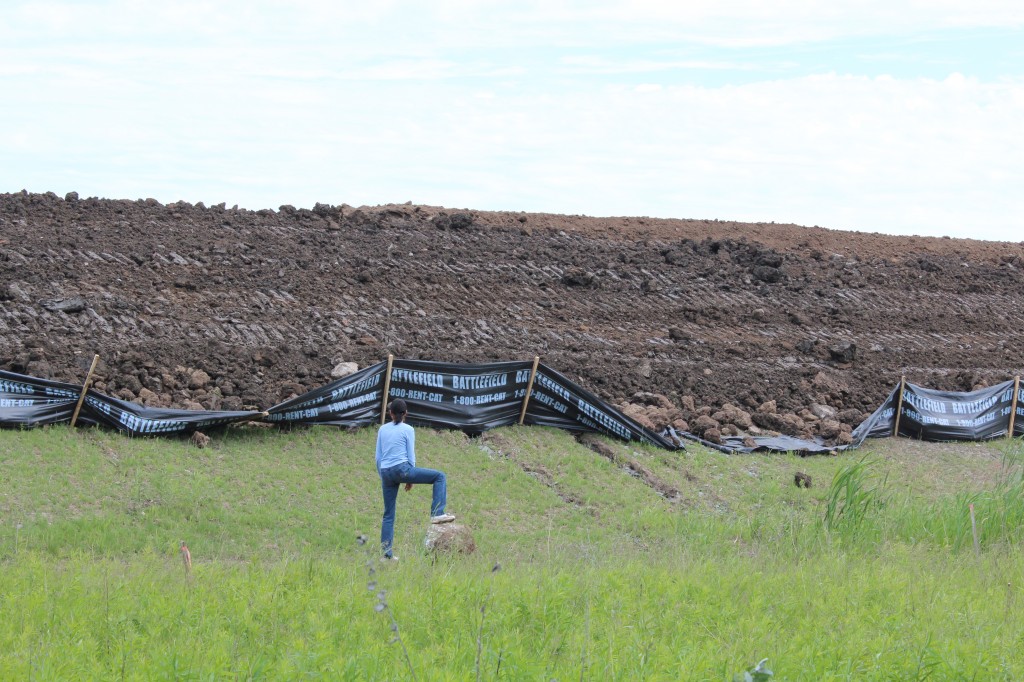 Getting tough, tough about compliance with the Site Plan bylaw will occupy the new city managers for a time – bigger decision to be made is what role does an air park play in the city’s longer term economic development plans. No one at city hall believes they can work with the air park owner. There are some tough decisions to be made on the Air Park. The city is believed to be ready to use the authority the courts have given them to enforce the Site Plan bylaw. There are property owners along Appleby Line that are watching this with great interest. The pain on this one is going to be shared.
Emotions are running very high in at least one household.
Burlington has land that is designated for employment use – many in the real estate field believe that some of that land is much more suited to residential use – which is music to the ears of the developers that own the land.
Burlington has some very important decisions to make. The Fielding approach was to make all kinds of side deals – at least one of those is going to come back and bite this council in the backside.
Burlington is struggling to find just the right balance between residential and commercial and then figure out how we manage the very large seniors’ population we are going to have.
The politicians talk about how well they are going to take care of that seniors’ population – those people vote.
 Frank McKeown, former Chief of Staff to Mayor Rick Goldring now runs the Economic Development Corporation. His objectives don’t fit all that well with a growing seniors population that will require more in the way of services. Making Burlington a high-tech haven and a seniors heaven is going to be a challenge. Frank McKeown now runs the Economic Development Corporation – he isn’t comfortable with the idea of Burlington being seen as a seniors heaven; that doesn’t jive very well with a vision of a city that has loads of high-tech talent and is one of the most pleasant and safest places to live – expensive perhaps but the high tech field pays very well.
James Ridge and his wife are going to take four days to drive from Vancouver to Burlington with heir four pets in the car. One can imagine the conversations that will take place – between the husband and wife – we don’t believe the pets talk.
Staff know next to nothing about the man who is going to lead the administrative side of the city. Ridge will want to determine as quickly as he can what he has in the way of bench strength and figure out what he wants in the way of a senior level administrative structure. Right now many of the eggs are in Stewart’s basket.
During the early Goldring first term there were three General Managers. That got whittled down to two with the working relationship with one of those two less than sterling.
Roman Martiuk was the City Manager at the time; he wasn’t able to form the kind of working relationship Goldring wanted and after just over two years Martiuk moved on – ok he was pushed out.
Goldring himself had a very difficult first two years getting the hang of the job for which he wasn’t all that well prepared. His wisest move was bringing Frank McKeown in as Chief of Staff but that didn’t last.
Fielding’s octane level was far too high for this council. Time will show just how rough shod he ran over this council.
Besides the Air Park matter and the decisions to be made on what we do with the employment land we have there is a document that sets out what taxes could look like twenty years out. It is not a pretty picture.
Welcome to Burlington James Ridge!

 By Ray Rivers By Ray Rivers
March 2, 2015
BURLINGTON, ON
 That title has to be taken tongue in cheek. British author Maria Lewycka provides a valuable look into Ukrainian society through her charming novel about Ukrainian tractors. Although trade between Russia and Ukraine has pretty much come to a halt, except Russian gas, following Russia’s invasion, the economies of the two countries had been closely intertwined during the days of the USSR. As ironic as it seems today, Ukraine had been a major provider of military equipment for the Soviet block, including rocket and helicopter engines, and even tanks (tractors in the book).
At the moment it is like watching a school-yard bully kick the crap out of a smaller kid and steal his lunch money. And we in the west are holding a ring-side seat, frozen by the obscene spectacle and hoping, in vain, that the irrational aggressor will come to his senses. Having expressed our concerns and imposed some mild sanctions to ease our guilt, we find ourselves shouting words of encouragement from the sidelines but are hesitant to help with significant material substance.
Similarities to Germany’s 1938 invasion of Czechoslovakia are eerie. Russia, unable to control its lesser neighbour, has invaded on the flimsy and false pretext of protecting the linguistic rights of Russian speakers there. But in this the truth lies somewhere else. The cunning Vlad Putin is either unable to distinguish between fantasy and reality, or is so bent on aggression against his neighbour that it doesn’t matter.
It might look as if Russia’s invasion was part of a greater long term strategy, which recent evidence shows it was. Back over a year ago there were rumours of Russian parliamentarians exploring Hungarian and Polish interest in the division of Ukraine – in the spirit of Stalin and Hitler’s pact to divide Europe between them (Molotov–Ribbentrop Pact).
The former Ukrainian president Yanukovych, elected in 2010, was essentially Putin’s puppet. He ran down the military and the economy, making the country vulnerable and weak, and ripe for the ensuing aggression. Under Kremlin pressure he cancelled plans for the Ukraine to join the EU, which ordinary Ukrainians had regarded as their last hope of rescuing their failing economy and ending corruption.
When the people protested, he called on Putin to help him. And Putin apparently complied providing sharpshooters who killed over a hundred of the protesters. Then fearing for his life and having lost his moral authority in parliament, by even his own party, Yanukovych fled to Russia, taking the federal treasury ($40 billion) with him. Interpol has recently issued a warrant for his arrest.
 Crack Russian troops invading the Crimea. While Ukrainian parliamentarians were sorting out how to govern, and with the conclusion of the Sochi Olympics, Putin made his move. First he invaded and annexed Crimea and then moved into eastern Ukraine. As the recovering Ukrainian army was in the process of expelling the pro-Russian forces in the east last summer, Putin uncloaked his military might, sending in his crack troops, modern tanks and advanced weapon systems to defeat them.
A desperate Ukraine agreed to a ceasefire freezing battle lines (Minsk). However, the Russian president, despite all his denials, ignored every aspect of the agreement. He continued to send more troops and advanced weapons to ensure that the out-gunned Ukrainians would not be able to retake pro-Russian seized territory, and allowing his forces to continue grabbing more land.
Then there is the matter of the Russian missile which knocked down a Malaysian airliner last summer, killing all 300 people on board (including a Canadian). Since the rest of the world seems impotent to deal with this event, it will likely require legal action by the aggrieved victims’ families to register some measure of accountability. And there is now evidence that Putin’s people have been conducting a terrorist campaign, planting bombs all over Ukraine, including at a recent peace march.
Putin has been jailing or exiling all of his political opponents over the last few years, as he has steadily moved Russia back towards autocracy. On Friday his most effective opponent, in fact his once former deputy prime minister, was gunned down in a professional assassination – reminiscent of KGB contract killings.
Vladimir Putin’s Russia is the antithesis of the way we in the west believe a major military power should behave. Yet nobody is prepared to stand up to him in any meaningful way – in any way that might change his behaviour. Putin told the west that sanctions would not work and they haven’t. Yes, sanctions and lower oil prices have hurt the Russian economy, but Putin is not going to be swayed by economics.
 Putin won’t stop until he is stopped. Ukrainians know this but nobody else seems to get it. Obama, Merkel, Hollande, and even our own Harper, keep saying that there is no ‘military solution’ to the crisis. But they couldn’t be more wrong, as events have shown. The former KGB agent is all about his military might. To get his attention he needs to believe that his military could fail to meet its objectives. Negotiating terms with Putin is a one way street, with the traffic going only in his direction. Call this kind of negotiation what it is – appeasement. Putin won’t stop until he is stopped. Ukrainians know this but nobody else seems to get it. Obama, Merkel, Hollande, and even our own Harper, keep saying that there is no ‘military solution’ to the crisis. But they couldn’t be more wrong, as events have shown. The former KGB agent is all about his military might. To get his attention he needs to believe that his military could fail to meet its objectives. Negotiating terms with Putin is a one way street, with the traffic going only in his direction. Call this kind of negotiation what it is – appeasement.
Appeasement failed to stop Hitler in 1938 (Neville Chamberlain in Munich) and it will not work in Ukraine (Minsk). Ukraine has asked the west to supply it with modern weapons to defend itself against Russia’s unprovoked military aggression. Ukraine is in the process of a massive mobilization of its youth, but needs training and modern weapons for its conscripts to be able to defend themselves. We in the west, including Canada, have that technology in spades.
 Ukraine became a source of agriculture for the |Soviet Union and Europe. They were never quite as good as the Massey Ferguson tractors Toronto factories shipped to farms throughout Western Canada Canada has always had a special relationship with the Ukraine. After all this country has received more Ukrainian immigrants than anywhere else outside of Russia. Ukrainian-Canadians have recently been coming out to help the country of their heritage, including joining troops on the front line against the pro-Russian military forces.
Ukrainian-Canadians know we have the ability to supply the training and arms that Ukraine needs, or that we should be able to help influence other nations to move in that direction. There is no partisanship here. Every single Canadian government has supported Ukraine’s struggle for independence, including making us the first nation to recognize the new country after the breakup of the USSR.
Stephen Harper has been among the most vocal anywhere in defending the sovereignty of Ukraine. We have offered some financial assistance and some non-lethal military supplies. But our Ukrainian Canadians, who have become some of the PM’s staunchest supporters, know that we can and should do much more.
 Ray Rivers writes weekly on both federal and provincial politics, applying his more than 25 years as a federal bureaucrat to his thinking. Rivers was a candidate for provincial office in Burlington where he ran as a Liberal against Cam Jackson in 1995, the year Mike Harris and the Common Sense Revolution swept the province. Rivers describes himself “as of Ukrainian extraction”. Ray Rivers writes weekly on both federal and provincial politics, applying his more than 25 years as a federal bureaucrat to his thinking. Rivers was a candidate for provincial office in Burlington where he ran as a Liberal against Cam Jackson in 1995, the year Mike Harris and the Common Sense Revolution swept the province. Rivers describes himself “as of Ukrainian extraction”.
Background links:
Ukrainian Tractors Soviet-Nazi pact Invasion Strategy Appeasement Failure
Breaking the Ceasefire Breaking the Truce Mis-reading Putin Need for Weapons Putin
Full Scale War Russian Contract Killing Russian Terrorism Putin’s Plans Canada’s Role
Price of Appeasement
Canadians in Ukraine Canadian Persuasion

|
|
 By Ray Rivers
By Ray Rivers



 Ray Rivers writes weekly on both federal and provincial politics, applying his more than 25 years as a federal bureaucrat to his thinking. Rivers was a candidate for provincial office in Burlington where he ran as a Liberal against Cam Jackson in 1995, the year Mike Harris and the Common Sense Revolution swept the province.
Ray Rivers writes weekly on both federal and provincial politics, applying his more than 25 years as a federal bureaucrat to his thinking. Rivers was a candidate for provincial office in Burlington where he ran as a Liberal against Cam Jackson in 1995, the year Mike Harris and the Common Sense Revolution swept the province. 














 There are parts of the city where any form of intensification is not going to get past the first sentence. The backlash in some communities will be so strong that the Mayor, and every member of this Council, will quickly move on to a subject that leaves smiles on the faces of the voters.
There are parts of the city where any form of intensification is not going to get past the first sentence. The backlash in some communities will be so strong that the Mayor, and every member of this Council, will quickly move on to a subject that leaves smiles on the faces of the voters.





 Ray Rivers writes weekly on both federal and provincial politics, applying his more than 25 years as a federal bureaucrat to his thinking. Rivers was a candidate for provincial office in Burlington where he ran as a Liberal against Cam Jackson in 1995, the year Mike Harris and the Common Sense Revolution swept the province.
Ray Rivers writes weekly on both federal and provincial politics, applying his more than 25 years as a federal bureaucrat to his thinking. Rivers was a candidate for provincial office in Burlington where he ran as a Liberal against Cam Jackson in 1995, the year Mike Harris and the Common Sense Revolution swept the province.

 According to the great economist John Maynard Keynes, governments should run surplus budgets in good times so they can pay down the debt they need to run in the bad times. Yet the Canadian government has been running deficits ever since the recession ended in 2010 and Ontario is still three years from getting to a balance.
According to the great economist John Maynard Keynes, governments should run surplus budgets in good times so they can pay down the debt they need to run in the bad times. Yet the Canadian government has been running deficits ever since the recession ended in 2010 and Ontario is still three years from getting to a balance.




 The only way to secure the “green belt” is to make sure that most people would prefer to live inside the “intensification zone”. This requires a focus on improving the liveability of the areas under intensification. Every development which brings in people without an obvious improvement to the community is negative.
The only way to secure the “green belt” is to make sure that most people would prefer to live inside the “intensification zone”. This requires a focus on improving the liveability of the areas under intensification. Every development which brings in people without an obvious improvement to the community is negative.







 There is a situation on city council where the first cardinal rule has not been observed. At the least it calls for a discussion between the member of council and the city solicitor on what the rules are and how they are to be observed. Some have asked: Is there not a code of conduct? Apparently not – quite why one needs a code to regulate decency is beyond me.
There is a situation on city council where the first cardinal rule has not been observed. At the least it calls for a discussion between the member of council and the city solicitor on what the rules are and how they are to be observed. Some have asked: Is there not a code of conduct? Apparently not – quite why one needs a code to regulate decency is beyond me. The city administration doesn’t have the same authority with volunteers. Investigations can take place and copies of reports made available to the offending party. But it is up to the members of the Seniors’ community to police themselves and set out the standard they want to see met.
The city administration doesn’t have the same authority with volunteers. Investigations can take place and copies of reports made available to the offending party. But it is up to the members of the Seniors’ community to police themselves and set out the standard they want to see met.



 The question this new legislation begs is how many civil liberties are we prepared to surrender in the hope that the mitigative measures, specified in this bill, will prevent potential acts of terror. Yet perhaps the real question is whether these new measures will make much of a difference at all. Bluntly put, is moving towards a police state the most effective approach to dealing with the seeds and buds of the kind of discontent that motivates an individual, or group, to strike out violently against fellow Canadians?
The question this new legislation begs is how many civil liberties are we prepared to surrender in the hope that the mitigative measures, specified in this bill, will prevent potential acts of terror. Yet perhaps the real question is whether these new measures will make much of a difference at all. Bluntly put, is moving towards a police state the most effective approach to dealing with the seeds and buds of the kind of discontent that motivates an individual, or group, to strike out violently against fellow Canadians?




 This change is about the kind of building projects we’ll see built in Ontario and how we will pay for the stuff we build. I suspect that members of Burlington and other City councils who subscribe to the failed dogma of Libertarianism won’t like this legislation one bit. To them I say: “suck it up princess, the free ride is over”. Specifically these Planning Act Changes propose to:
This change is about the kind of building projects we’ll see built in Ontario and how we will pay for the stuff we build. I suspect that members of Burlington and other City councils who subscribe to the failed dogma of Libertarianism won’t like this legislation one bit. To them I say: “suck it up princess, the free ride is over”. Specifically these Planning Act Changes propose to:







 John Waldie spent most of his time in Toronto during 1886 preparing to create his biggest business venture to date.
John Waldie spent most of his time in Toronto during 1886 preparing to create his biggest business venture to date.














 Putin won’t stop until he is stopped. Ukrainians know this but nobody else seems to get it. Obama, Merkel, Hollande, and even our own Harper, keep saying that there is no ‘military solution’ to the crisis. But they couldn’t be more wrong, as events have shown. The former KGB agent is all about his military might. To get his attention he needs to believe that his military could fail to meet its objectives. Negotiating terms with Putin is a one way street, with the traffic going only in his direction. Call this kind of negotiation what it is – appeasement.
Putin won’t stop until he is stopped. Ukrainians know this but nobody else seems to get it. Obama, Merkel, Hollande, and even our own Harper, keep saying that there is no ‘military solution’ to the crisis. But they couldn’t be more wrong, as events have shown. The former KGB agent is all about his military might. To get his attention he needs to believe that his military could fail to meet its objectives. Negotiating terms with Putin is a one way street, with the traffic going only in his direction. Call this kind of negotiation what it is – appeasement.




